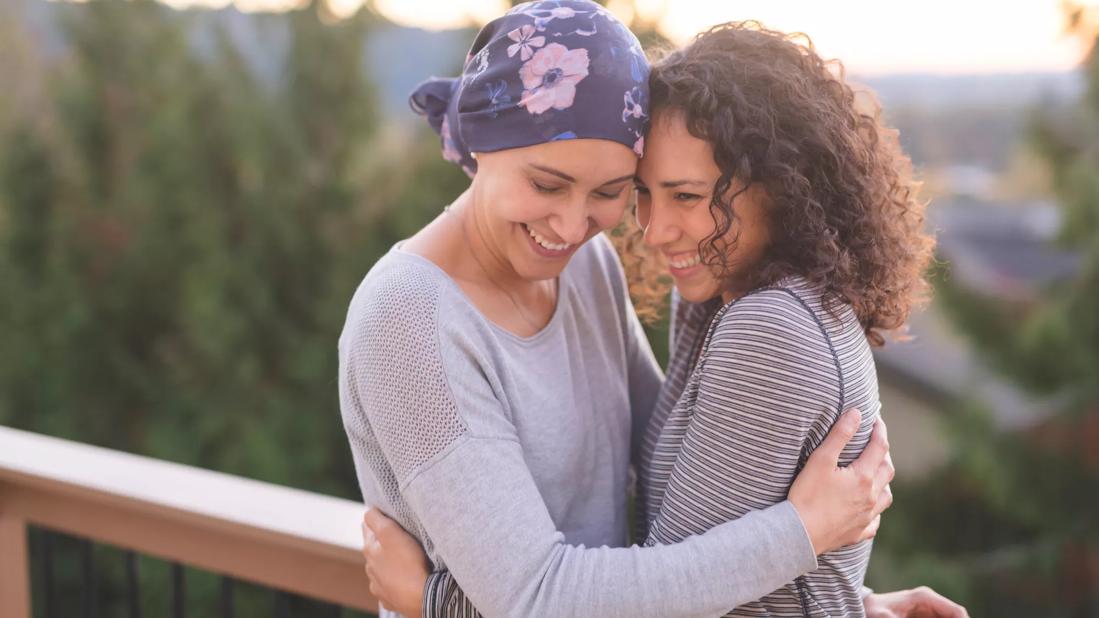How to help your family member or friend

Image content: This image is available to view online.
View image online (https://assets.clevelandclinic.org/transform/d6fc4690-aa85-40f6-b3d3-62237ccc9cc5/GettyImages-1028537222_jpg)
When Someone You Love Has Cancer: 9 Practical Tips + Insights
Your family member or best friend has been diagnosed with cancer. Life, as you know it, has forever changed.
Advertisement
Cleveland Clinic is a non-profit academic medical center. Advertising on our site helps support our mission. We do not endorse non-Cleveland Clinic products or services. Policy
Those who have cancer ride an emotional roller coaster as they navigate doctors, tests and procedures. What should you know to be most helpful to them?
“It’s important for your loved one to hear, ‘I get it. This is hard for you,’” says psychosocial oncologist Joel Marcus, PsyD.
Along with compassion, he shares nine other insights and tips for supporting your loved one:
Chemotherapy, radiation, surgery — no cancer treatment is fun. Hair loss, nausea, skin and body changes, and dry mouth cause real distress. “Your loved one may see them as outward signs of inner disease,” explains Dr. Marcus.
Urge your loved one to tell the oncologist promptly about pain, nausea, vomiting, numbness or tingling. “Symptoms gather steam like a boulder rolling down a hill; the doctor can help ‘stop it at the top,’” he says.
We now know that chemotherapy affects short-term memory, which triggers great anxiety. Remind your loved one to stay in the moment by breathing deeply. Relaxing the mind will ease memory retrieval. Games like chess and Sudoku can also exercise the mental muscles.
A warm blanket will keep your loved one cozy in the chilly chemotherapy room. Help them while away the hours by contributing an engrossing book, some great music or a binge-worthy show to their chemo bag.
Advertisement
“A healthy lifestyle is key, but so is quality of life,” says Dr. Marcus. Is a vegan diet OK? No problem, as long as nutritional needs are met. Can’t live without sweets? No need to. Just focus on a balanced diet. Is meat safe to eat? It may well be (as long as you don’t overdo red meat); check with your oncologist.
Exercise is critical for health. Suggest your loved one try yoga (doubly helpful because of its mind-body connection). Join them in doing an activity they love — dancing, taking walks — when they have the energy.
When cancer affects your partner, it can have a chilling effect on body image and the ability to respond. But “sex is vital. It’s our most intimate form of communication,” says Dr. Marcus. Tell the oncologist; many sexual issues are easily fixed, he says.
If your loved one is an adolescent, ask about their plans for a family in the future, he advises. If treatment might threaten fertility, ask the doctor about sperm or egg banking. And reassure teens they’ll be able to date, enjoy relationships and marry like anyone else.
Immunotherapy is changing the face of cancer treatment. If your loved one’s oncologist suggests a trial of immunotherapy, listen carefully, he says. Every helpful cancer drug has gone through the same clinical trials process.
“Keep communicating honestly with your loved ones. Be clear about your thoughts and feelings,” urges Dr. Marcus.
Showing up in practical, heartfelt ways can make life a little easier for your loved one on their cancer journey.
Advertisement

Sign up for our Health Essentials emails for expert guidance on nutrition, fitness, sleep, skin care and more.
Learn more about our editorial process.
Advertisement
Prioritize protein and fresh produce, but be extra careful to avoid bacteria that could cause foodborne illnesses
Here’s how (and why) to ask your doctor about treatment goals, second opinions, clinical trials and more
Rates of early-onset breast, colorectal and GI cancers are increasing, but preventive care and a healthy lifestyle can help reduce your risk
The side effects of cancer and treatment can impact desire, sexual function and intimacy, but there are ways you can keep the flame going
Decisions you make regarding smoking, alcohol use, meal choices and exercise can make a big difference
Taming fear and reclaiming your future after treatment
Carcinomas are the most common and affect skin and organs
7 healthy eating tips to help reduce your risk of some of the most common types of cancer
Although it could be used as a moisturizer, this new trend is not recommended
Communicating clear limits helps protect your time, energy and emotional well-being
High cholesterol can be genetic, but testing and treatment can lower your heart disease risk